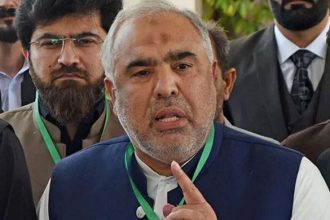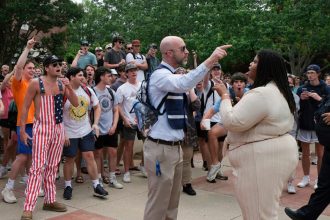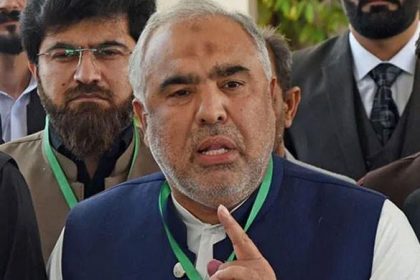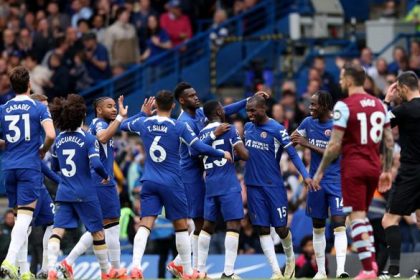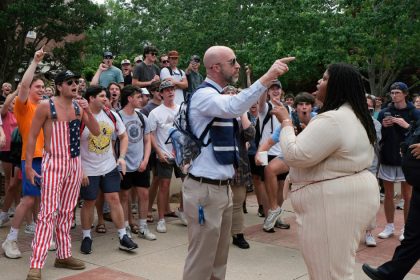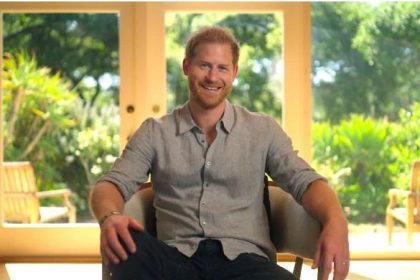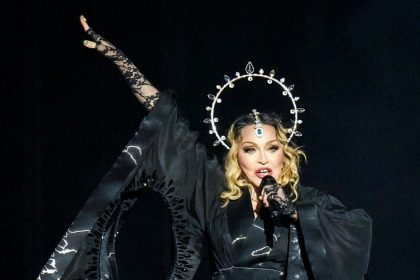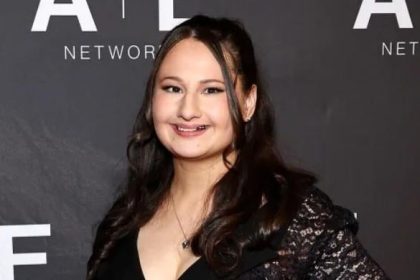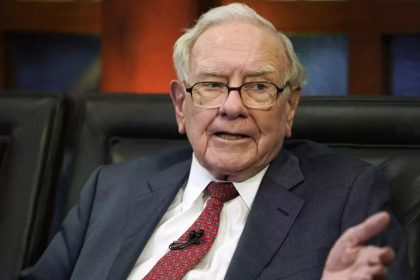A key witness in Donald Trump‘s criminal trial testified Thursday about his role in hush money payments to a porn actress and a Playboy model the former president allegedly had affairs with — and Trump’s plan to make sure other negative stories about him never saw the light of day.
David Pecker, the former publisher of the National Enquirer, said Trump at one point sought to buy the rights to Karen McDougal‘s allegations of a months-long affair with him as well as other information the Enquirer had on him in its archives. Trump has denied McDougal’s claims.
Pecker said he eventually backed out of the deal for fear he could get into legal trouble — and that when he heard about adult film star Stormy Daniels’ claim of a 2006 sexual encounter with Trump, he decided he couldn’t front any more cash to keep his longtime friend out of trouble.
Daniels, he said, came forward as Trump’s campaign was reeling from the emergence of the so-called “Access Hollywood“ tape in the final weeks of the 2016 presidential campaign. The tape included a hot mic moment from 2005 that caught Trump, then the star of “The Apprentice,” saying he could kiss and grope women without their consent because “when you’re a star, they let you do it. You can do anything.”
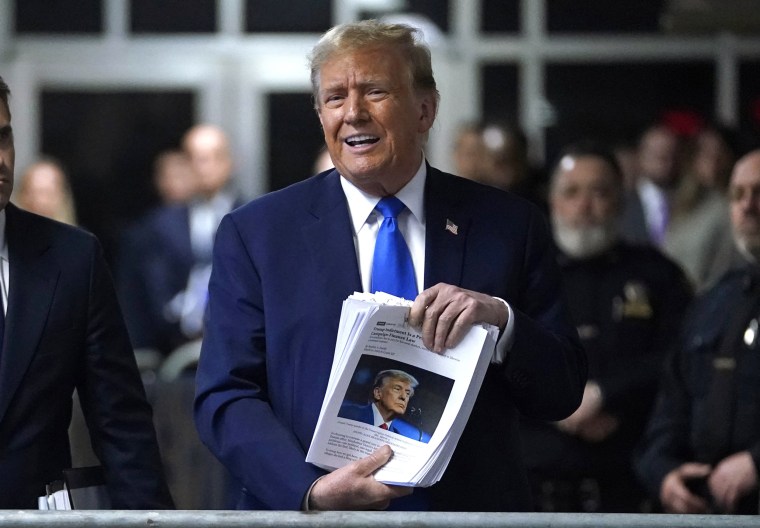
He said he was told by Enquirer editor-in-chief Dylan Howard that Daniels was looking for $125,000 for her story, which he did not want to pay since he’d already shelled out $180,000 to quash two other stories that could have damaged Trump’s campaign. “I am not a bank,” he told Howard in a text message.
He said he reached out to Trump attorney Michael Cohen and told him about Daniels’ claim, and advised him that he should pay her. He said Cohen responded that the Enquirer should pay her. “I said I am not purchasing this story. I am not going to be involved with a porn star,” Pecker recounted, adding that retailer Wal-Mart was his biggest seller of magazines, a store with conservative roots.
Cohen agreed to pay Daniels’ lawyer $120,000, but initially didn’t pay. Pecker said he advised Cohen to cough up the cash “because if you don’t and it gets out, I believe the boss” — the term Cohen used to refer to Trump — “is going to be very angry with you.”
‘I’ll take care of it’
Pecker said he found out that Cohen was the one who paid Daniels in December 2016, when he met with Cohen at Trump Tower following the election. He said Cohen asked him if he could “talk to the boss on his behalf” about getting reimbursed. Cohen also asked him if he could review the Enquirer’s files on Trump, a request Pecker said he refused.
Trump eventually joined the meeting, and Pecker said Cohen told the president-elect “I went through the files. We have nothing to be concerned about.”
Pecker said he then walked alone with Trump to his office, and pleaded Cohen’s case. He said Trump told him, “Don’t worry about it. I’ll take care of it.”
He was called back to meet with Trump at his Manhattan office in January, and walked in to see him surrounded by the likes of FBI Director James Comey, his soon-to-be chief of staff Reince Priebus and his pick for CIA director, Mike Pompeo, who’d been briefing him on a shooting at a Florida airport.
During their subsequent meeting, Trump asked “how Karen’s doing.” Pecker told him “things are going fine.”
He said Trump thanked him for “handling” her “situation,” and another involving a doorman who’d falsely claimed Trump had an illegitimate child. “The stories would have been very embarrassing,” he quoted Trump as saying.
McDougal was apparently still on Trump’s mind even after he was sworn in as president. Pecker said Trump invited him, Howard and another of their business associates to the White House for a “thank you” dinner in July of 2017, where they toured the Oval Office. As they walked to dinner, Pecker said the president asked him how McDougal was doing. Pecker told him things were “going good.”
The McDougal payment came about after Howard interviewed the model when she expressed an interest in coming forward in 2016. Howard told Pecker he believed her story about a 2006 affair with Trump, but said she had no corroborating evidence. Pecker said he believed her story too, after he spoke to Trump about her on the phone. “He said she is a nice girl,” Pecker recounted.
He said Cohen called him the next day and told him he should “go ahead and buy the story” from her. Pecker said he’d have Howard negotiate the terms but asked who would pay for it. He said Cohen responded that “the boss will take care of it.”
Pecker added that Cohen wouldn’t have the authority to spend any money without Trump’s approval.
Howard eventually reached a deal where they would pay McDougal $150,000 for her story and to “restart” her career with articles in fitness magazines that Pecker published. Pecker said he was unhappy about having to front the money, but Cohen assured him “the boss” would reimburse him.
The eventual agreement barred McDougal from sharing details about “any romantic, personal and/or physical relationship McDougal has ever had with any then-married man” outside of Howard’s publishing company, which had zero intention of sharing them, Pecker said.
Asked by prosecutor Joshua Steinglass if his primary purpose in suppressing her story was to influence the 2016 election, Pecker said, “Yes, it was.”
“Were you aware that expenditures by a corporation made for the purpose of influencing an election and at the request of a candidate were unlawful?” Steinglass continued. “Yes,” Pecker responded calmly.
‘The boss is going to be very angry’
After they made the deal, Pecker repeatedly asked Cohen to be reimbursed. Cohen assured him he’d be paid, but said Trump also wanted something else from him — the rights to McDougal’s story and all the files the Enquirer had on him from over the years.
“The boss said if [Pecker] got hit by a bus or the company was sold he did not want someone else to potentially publish those stories,” Pecker quoted Cohen as telling him.
Pecker said there was nothing of note in the boxes they had on Trump, describing it as old files and articles that had already been published.
Pecker said he eventually agreed to a $125,000 deal, which Cohen would pay through a company he created called Resolution Consultants because Pecker was concerned he’d get into legal trouble if the publisher got a payment directly from Cohen or the Trump Organization. Those concerns eventually led him to drop his demand for reimbursement, telling Cohen it was “a bad idea.”
Cohen, he said, did not take the news well. “He was very, very angry, very upset, screaming basically with me,” Pecker said. Cohen also warned that “the boss is going to be very angry with you.”
On Nov. 4, 2016 — just days before Election Day — the Wall Street Journal ran a story involving McDougal headlined, “National Enquirer shielded Donald Trump from Playboy Model’s Affair Allegation.”
Pecker said he got a call from Trump at home. He “was very upset, saying, ‘How could this happen? I thought you had this under control. Either you or one of your people have leaked this story.’”
Pecker insisted he hadn’t, and had his company, AMI, issue a statement denying the accurate story.
Steinglass asked him why he’d authorized the statement. “I wanted to protect my company, I wanted to protect myself and I also wanted to protect Donald Trump,” Pecker responded.
McDougal went public with her claim in a March 2018 CNN interview, and sued Pecker’s company for allegedly misleading her into signing the agreement. Pecker said Trump called him after the interview and was “very aggravated.”
He called Pecker again a few days later after Daniels went public with her claim, and told him she’d pay for doing so.
“He said that we have an agreement with Stormy Daniels that she cannot mention my name or anything like this and that each time she breaches the agreement it is a $1 million penalty, and based on the interview with Anderson Cooper she owes me $24 million dollars,” Pecker said.
It was after that that Pecker said he got a letter from the Federal Election Commission. He said Cohen told him not to worry about because Trump’s attorney general at the time, Jeff Sessions, and “Trump has him in his pocket.”
The company later struck a non-prosecution agreement with federal prosecutors who were investigating Cohen. Cohen pleaded guilty to related charges.
Pecker revealed for the first time that he also signed a cooperation agreement with the Manhattan district attorney’s office back in 2019. The deal granted him immunity in the case, but warned he could be prosecuted for perjury if his testimony was not truthful.
Pecker said he last spoke to Trump in early 2019, but “I still consider him a friend.” Trump, he said, “was my mentor. He helped me throughout my career.”
On cross-examination, Pecker acknowledged it wasn’t unusual for him to kill a story. He said about half the stories the paper purchased from sources never made it into print, although some were used as leverage with celebrities to land other stories.
Trump attorney Emil Bove asked him if he’d also helped kill a negative story about Trump’s then-wife Marla Maples in 1998. Pecker said he had. The publisher said stories about Trump had historically been good for the paper’s sales, but negative stories about him were not.
Earlier in the day before Pecker resumed his testimony, prosecutors filed their third motion to have Trump held in contempt for violating the judge’s order banning him from making public statements about witnesses’ “potential participation” in the case. Prosecutor Chris Conroy said Trump had violated that order again with comments calling his former lawyer Michael Cohen a liar and saying Pecker “has been a very nice guy.” “This is a message to Pecker: be nice,” Conroy said.
The judge scheduled a hearing on the request for Wednesday afternoon, which is typically an off-day in the trial. He has yet ruled on the previous requests, which were the subject of a hearing on Tuesday morning.
Trump is charged with 34 counts of falsifying business records relating to money prosecutors say he used to repay Cohen for the hush money payment. He has pleaded not guilty.

